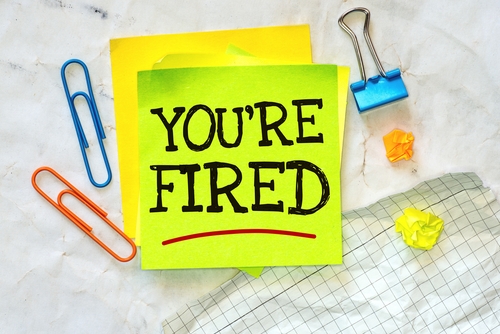
When to Fire an Employee
- On 12 August 2022
- Posted by Chantal Mariotti
When is it time to fire, or terminate an employee? A termination is the worst thing that can happen to an employee – and, you better have a good reason to end the employment relationship. Moreover, an HR best practice is to make sure you have the back up documentation, in writing, to secure the termination.
Termination for poor work performance
In the instances of poor or sub-standard work performance, it is always best to first coach and counsel your employee to give him/her the opportunity to improve. The unacceptable behaviors may include lack of teamwork or poor attitude, too many operational errors, or even poor attendance with tardiness or absenteeism.
We call this “progressive discipline”. In these cases, the best way to address the issues is to have conversations with the employee, letting them know what your expectations are, and where they are falling short. Once the employee is aware of your expectations, and how they are not meeting those (with specific examples), they should adjust their behavior. This conversation should be documented, and the document should be included in the employees’ personnel file. You may have to meet with the employee a few times if the behavior does not improve. Each time, the conversation should be documented. This is your “back-up” in case the termination is challenged. Typically, you’d want to give the employee three (3) chances; documenting your conversations as a verbal, written and then final written notice. Trust me. The 4th time you call the employee in your office to discuss this, they will not be surprised if they are terminated.
Bottom line – A termination should NEVER be a surprise!
Termination for serious violation of policy
Unlike progressive discipline, there are some instances we call serious violations of policy, that do not require a series of conversations to improve behaviors. These instances may include, but are not limited to:
- Proven harassment or discrimination of any kind
- Falsifying time records (considered stealing time)
- Fighting with or threatening an employee
- Stealing/misappropriation of funds
- Possession or use of alcohol or illegal drugs on the job
- Etc…
Your “Employee Handbook” should list all items requiring immediate termination, and your progressive discipline policy. Because the employee will have signed the acknowledgement of the employee handbook, they have read and know about your policies – what is, and what is not acceptable, and what are the consequences.
Be Consistent – Be Aware of Setting Precedents
If one employee is terminated for falsifying time records for example, then all other employees thereafter, who violate this same policy, should be terminated as well. You have set a “precedent”. If you do not terminate the 2nd employee who violated this policy, then the first employee can come back and file a discrimination case for example, because these two employees were treated differently.
Need Help?
If you need any assistance in terminating an employee, finding out if you have the proper back up documentation, or if you need assistance in creating or updating your employee handbook, search no further. Click here to find the perfect HR Consultant who can help you manage terminations: https://executivehrconsulting.com/hr-consultants
Our Mission Statement
“Through this platform, ECG pledges to provide quality HR & Hospitality resource referrals, from an exclusive and elite group of remarkable, service-oriented professionals, dedicated to serving you.”


